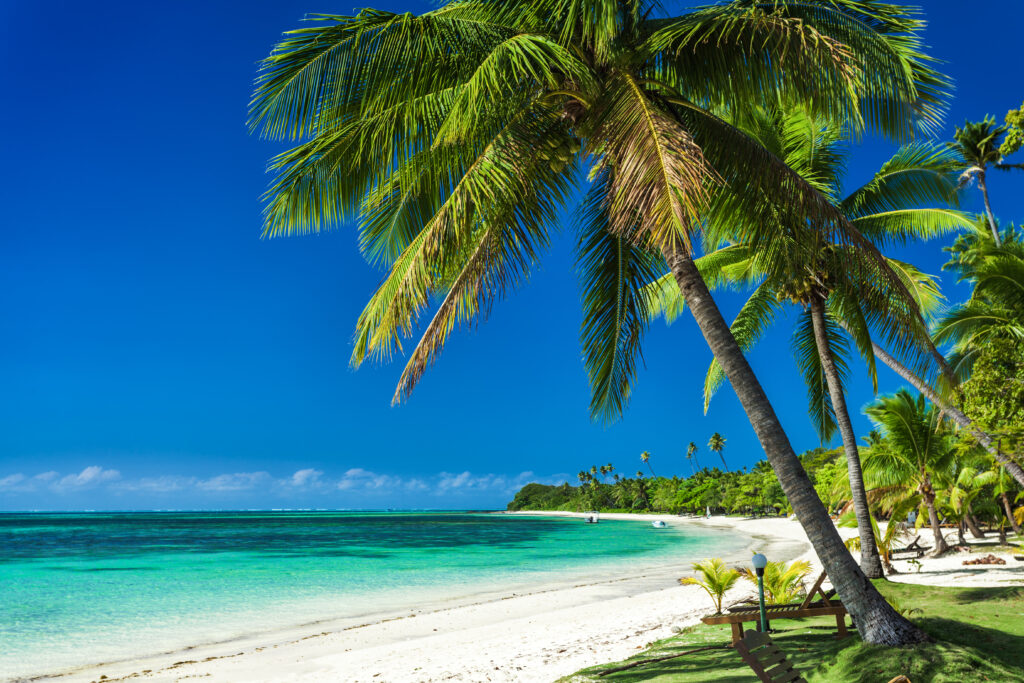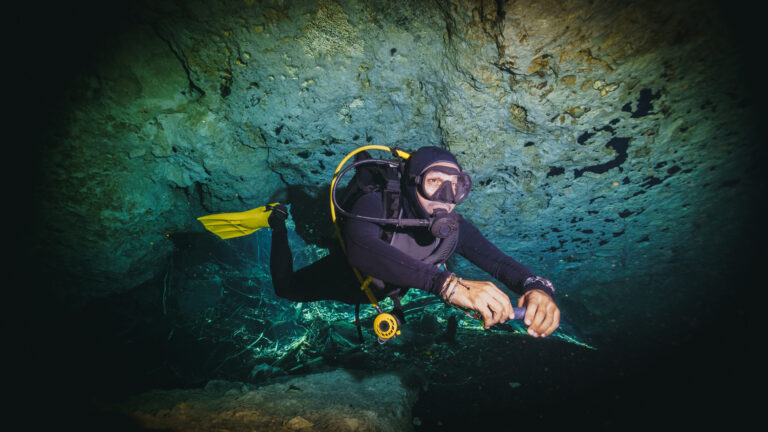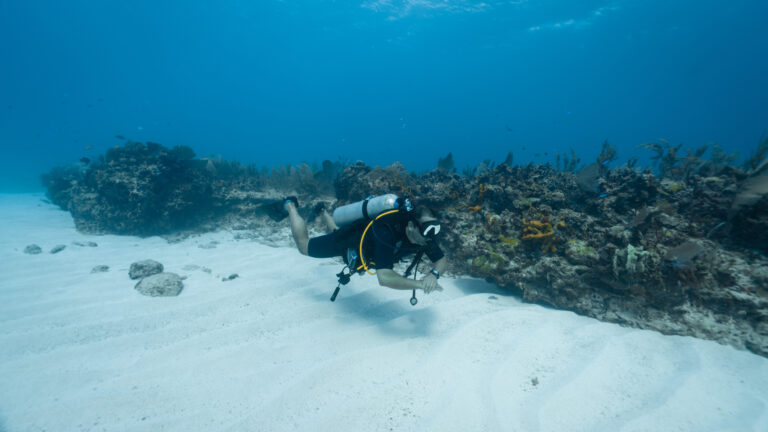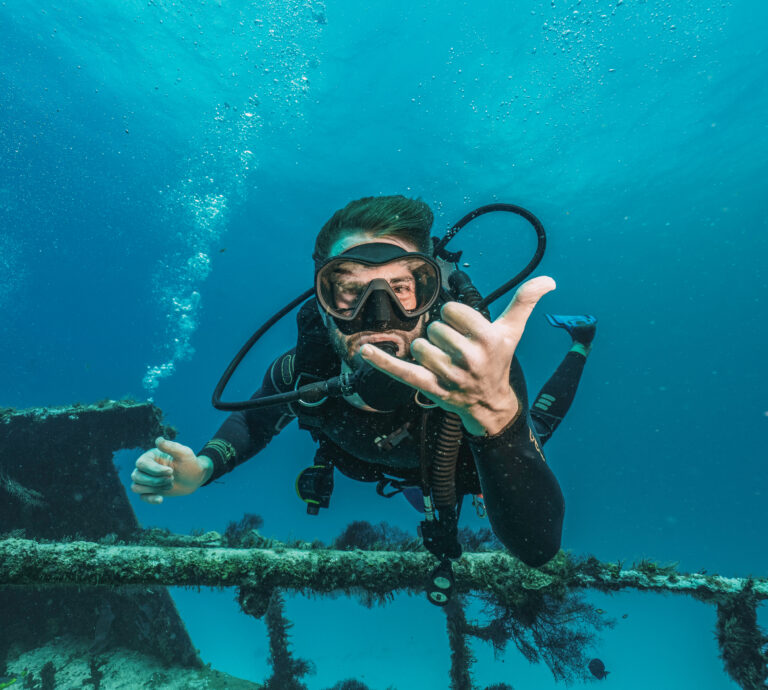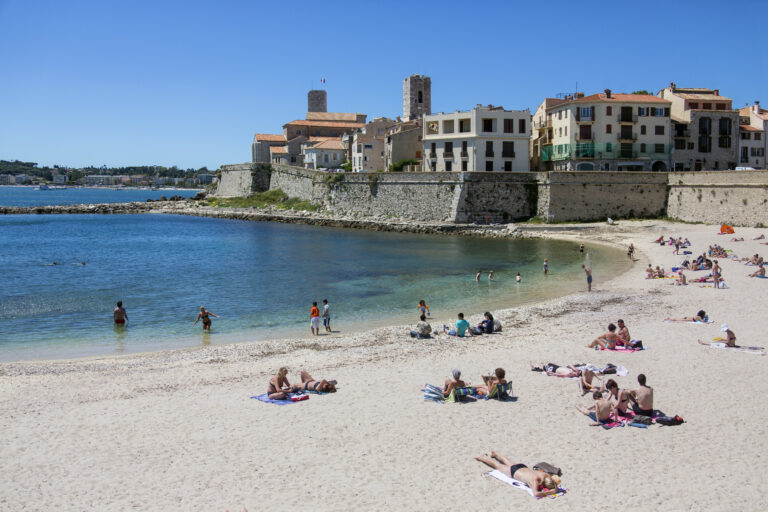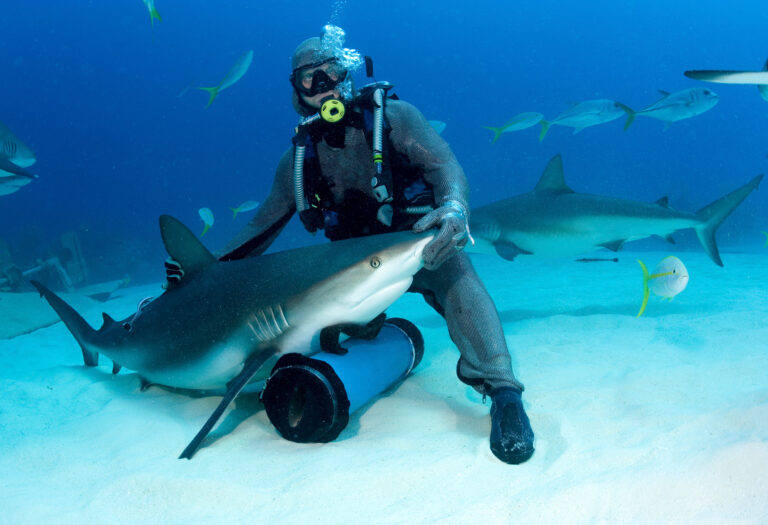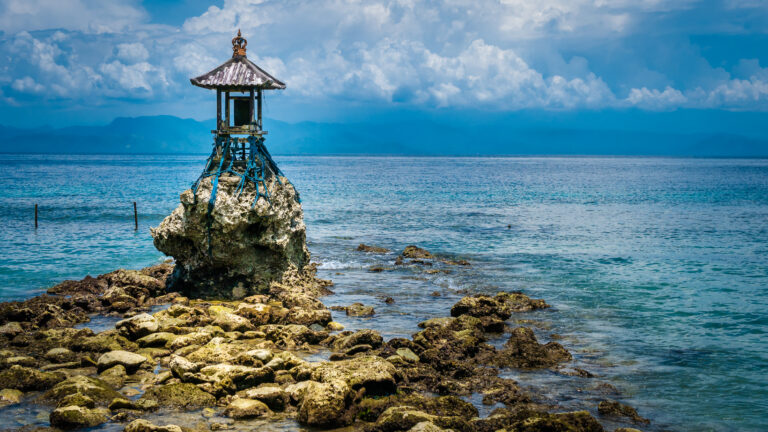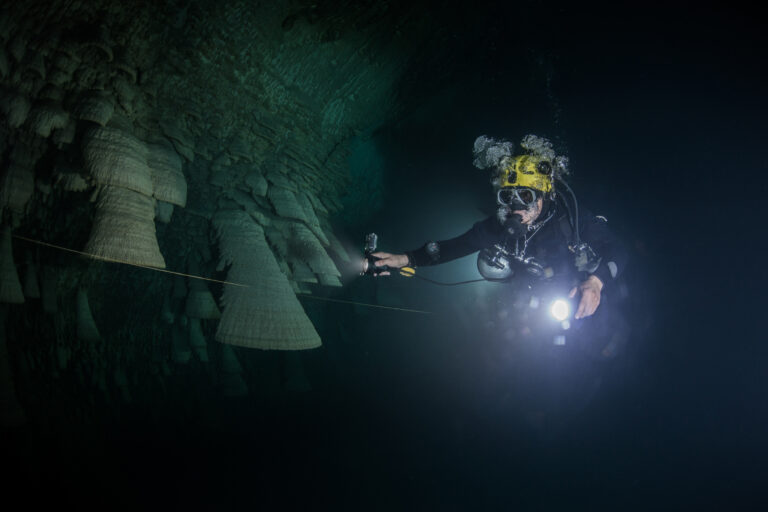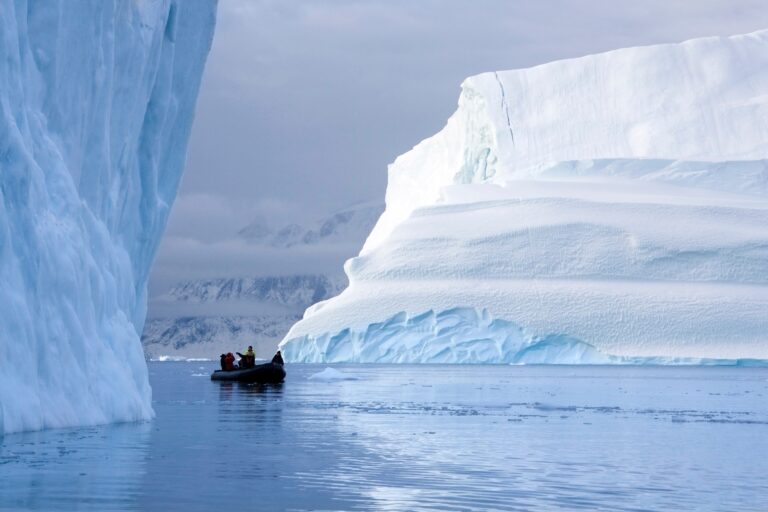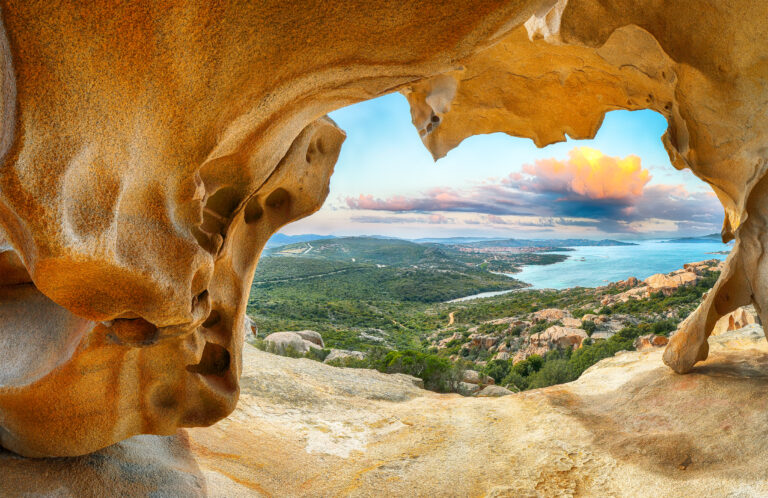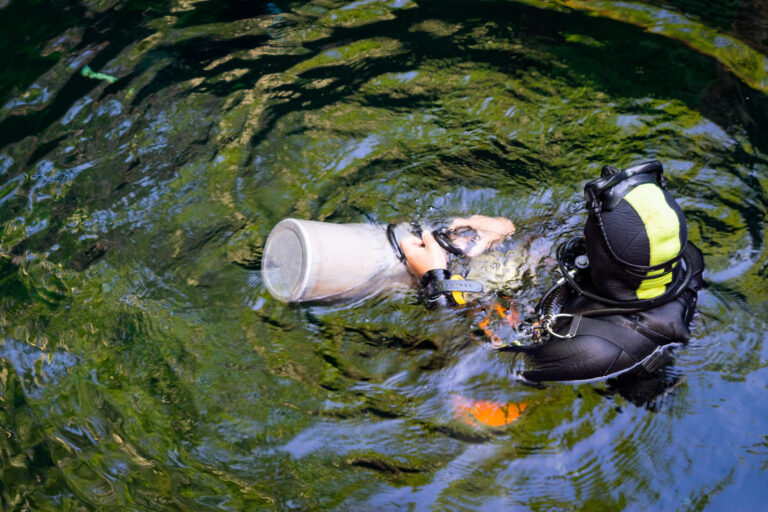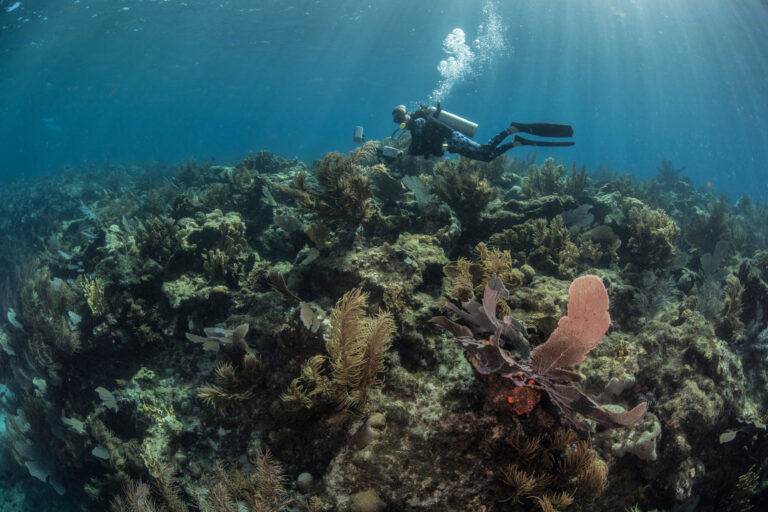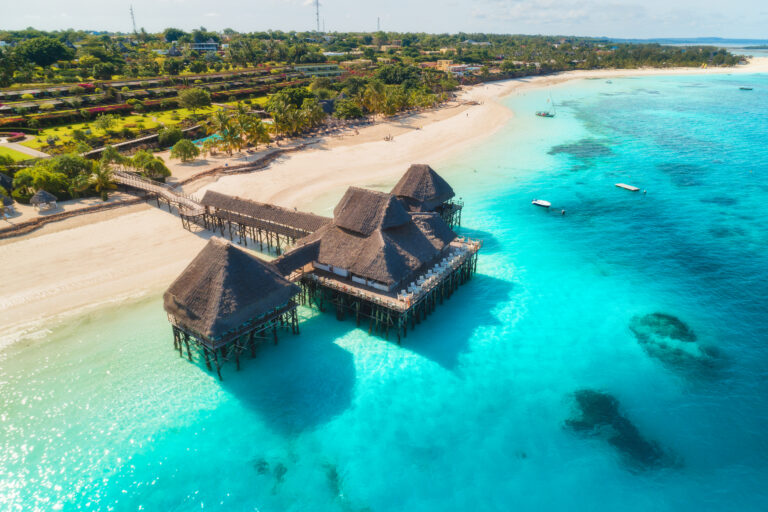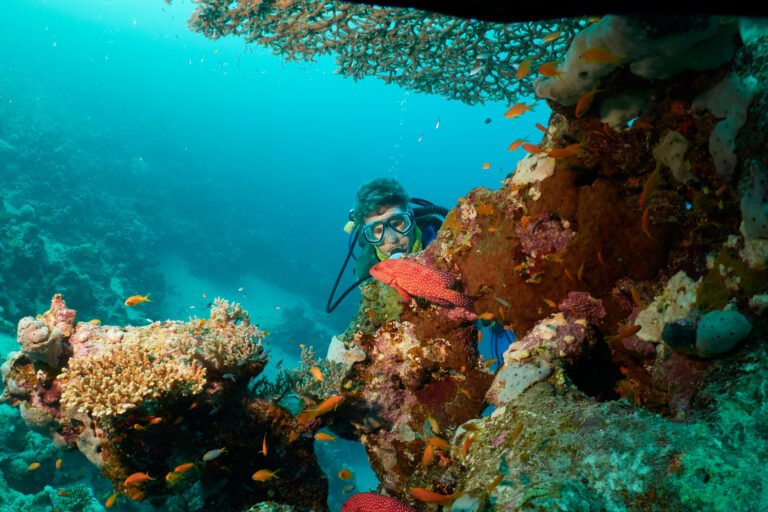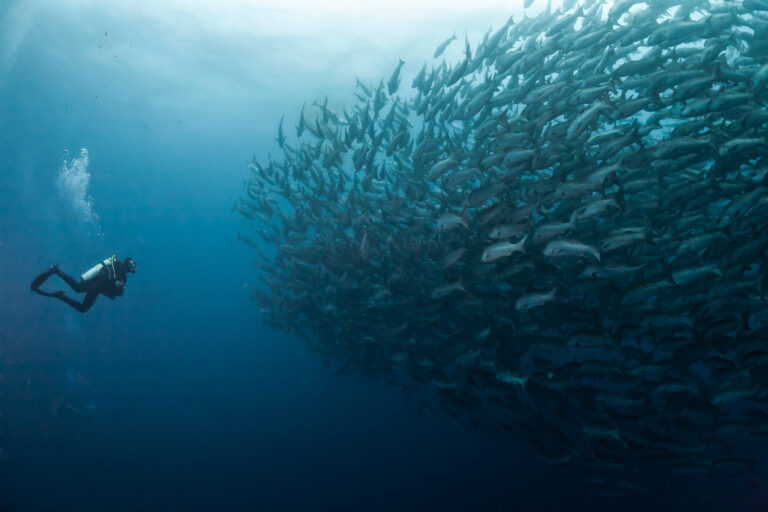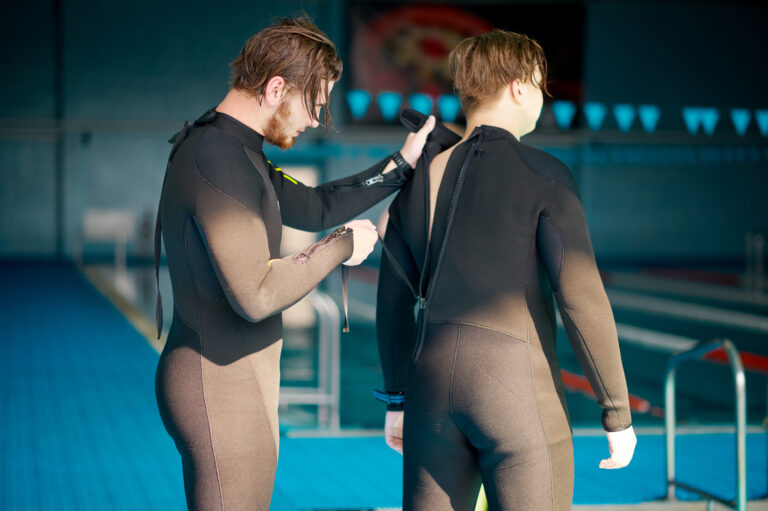SCUBA DIVERS’ TRAVEL GUIDE TO Fiji
Fiji is a paradise for scuba divers who want to explore the rich and diverse marine life of the South Pacific. This island nation boasts over 300 islands, each with its own unique charm and beauty. Whether you are looking for coral reefs, caves, wrecks, or pelagic encounters, Fiji has something for every diver. You can enjoy the warm and clear waters, the friendly and hospitable locals, and the stunning natural scenery. Fiji is also known for its culture and history, which you can experience through its festivals, music, and cuisine. Fiji is more than just a destination, it is a way of life. Come and discover why Fiji is called the “soft coral capital of the world” and the “land of smiles”.
LOCATION AND GEOGRAPHY
Fiji, an archipelago in the heart of the South Pacific, is a premier scuba diving destination renowned for its crystal-clear waters and vibrant marine biodiversity. Comprising more than 330 islands and 500 islets scattered over 1.3 million square kilometers, Fiji’s geography is as diverse as it is expansive. The majority of Fiji’s islands were formed through volcanic activity, which is now dormant, leaving behind a dramatic landscape both above and below the waterline. The islands are surrounded by coral reefs that form part of the soft coral capital of the world, offering a spectacular underwater tapestry for divers. The warm tropical climate and the convergence of major oceanic currents bring together an extraordinary array of marine life, from the smallest of reef fish to the majestic manta rays and sharks. Fiji’s location at the crossroads of the Pacific has also endowed it with a rich cultural heritage, making it not just a topographical paradise for divers, but also a location with a welcoming and vibrant island atmosphere.
VISA AND ENTRY REQUIREMENTS
Before embarking on your underwater adventure to the pristine reefs of Fiji, it is essential to ensure that your travel documents are in order. Visitors from many countries, including the United States, Canada, the European Union, Australia, and New Zealand, do not require a visa for stays of up to four months, provided they have an onward or return ticket and a passport valid for at least six months beyond their intended stay. However, it is always wise to check the latest visa requirements with the Fijian embassy or consulate in your home country prior to travel, as regulations can change. Upon arrival, you’ll receive a visitor’s permit, and if you wish to stay longer to explore more of Fiji’s underwater marvels, you can apply for an extension from the Department of Immigration in Suva. Keep in mind that some nationalities do require a visa in advance, so it’s crucial to verify your specific requirements well ahead of your planned dive trip.
GETTING TO Fiji
Getting to Fiji for an unforgettable scuba diving adventure is a journey that will take you to the heart of the South Pacific. Fiji is well-connected by air with several international airlines offering flights to Nadi International Airport, the main gateway to the islands, from major cities in Australia, New Zealand, Asia, and the United States. Upon arrival in Nadi, divers can take domestic flights or ferries to reach the various islands that make up this tropical paradise. Popular diving spots like the Mamanuca and Yasawa Islands, Taveuni, and Kadavu are accessible via short flights or boat rides, each offering a unique underwater experience. Travelers should ensure their travel arrangements align with their dive schedules, as some remote locations may have limited transportation options. With its clear waters, vibrant coral reefs, and abundant marine life, Fiji is a destination that rewards the effort it takes to reach its shores.
BEST TIME TO DIVE
Fiji, often referred to as the “Soft Coral Capital of the World,” offers a scuba diving experience that is as vibrant and diverse as its marine life. The best time to dive in these crystal-clear waters is during the Fijian winter, from April to October, when visibility can exceed 100 feet (30 meters) and the water temperatures are a comfortable 75-80°F (24-27°C). During this period, the trade winds bring drier weather and the seas are typically calmer, making it ideal for exploring the famous Rainbow Reef or the Great White Wall. Divers may also have the chance to witness the magnificent manta ray migration, which peaks around May. While diving is year-round in Fiji, November to March marks the wet season, which can bring reduced visibility and stronger currents, but also offers warmer waters and the opportunity to see bull sharks in the Beqa Lagoon. Whether you’re a novice diver or a seasoned underwater explorer, Fiji’s underwater spectacle is at its prime during the winter months, promising an unforgettable subaquatic adventure.
ACCOMMODATION OPTIONS
Fiji, a diver’s paradise with its crystal-clear waters and vibrant marine life, offers a wide array of accommodation options to suit every taste and budget. From luxurious overwater bungalows that provide direct access to the tranquil sea to eco-friendly resorts that focus on sustainability and conservation, there is a perfect spot for every underwater enthusiast. Budget-conscious travelers can find comfort in the numerous beachfront hostels and modest guesthouses that dot the islands, many of which offer dive packages and gear rentals. For those seeking a more immersive experience, liveaboard boats are an excellent choice, allowing divers to wake up at different dive sites each day. Traditional Fijian-style accommodations, known as ‘bures’, offer a unique cultural experience combined with modern amenities, often nestled within steps of the shore. No matter where you choose to stay, the warm Fijian hospitality and the islands’ natural beauty will ensure a memorable scuba diving adventure.
DIVE OPERATORS AND DIVE SHOPS
In the heart of the South Pacific, Fiji’s crystal-clear waters and vibrant coral reefs offer an underwater spectacle that draws divers from around the globe. When selecting a dive operator or dive shop in Fiji, you’ll find a plethora of professional and eco-conscious establishments ready to enhance your underwater adventure. Renowned for their warm hospitality, Fijian dive shops typically offer a range of services, from PADI certification courses to guided dives for all experience levels. Many operators are intimately familiar with the local marine environment and can take you to the most enchanting dive spots, such as the Great Astrolabe Reef or the soft coral capital, the Rainbow Reef in the Somosomo Strait. Safety and environmental responsibility are paramount, with operators adhering to strict standards to ensure the protection of Fiji’s delicate marine ecosystems. Whether you’re staying on the main islands like Viti Levu and Vanua Levu, or at a secluded resort on the smaller islands, you’ll find dive operators equipped with well-maintained gear, knowledgeable staff, and the spirit of ‘Bula’ hospitality that makes diving in Fiji an unforgettable experience.
TRANSPORTATION WITHIN Fiji
Transportation within Fiji offers a variety of options to access its stunning scuba diving locations, catering to the needs of divers and travelers alike. The two main islands, Viti Levu and Vanua Levu, are well-connected by a network of buses and taxis for land travel, while private car rentals offer more flexibility for those looking to explore at their own pace. For reaching the outer islands and remote dive sites, domestic flights operated by Fiji Airways and smaller carriers like Northern Air provide quick aerial transfers, and are often the most efficient way to hop between islands. Additionally, ferries and water taxis are widely used for inter-island travel, offering a scenic journey across the crystal-clear Fijian waters. These boats range from large, comfortable vessels to smaller, more personal crafts, ensuring that divers can access even the most secluded underwater paradises with ease. Always remember to plan your transportation in advance, especially to the less frequently serviced islands, to ensure a smooth and enjoyable diving adventure in Fiji’s aquatic wonderland.
CURRENCY AND PAYMENT METHODS
In Fiji, the official currency is the Fijian dollar (FJD), and it’s advisable for scuba divers to have some local currency on hand for small purchases, tips, and services where credit cards may not be accepted, especially in more remote diving locations. Major hotels, resorts, and dive operators typically accept credit cards, with Visa and MasterCard being the most widely accepted, followed by American Express. However, it’s important to note that some establishments may charge a service fee for credit card transactions. ATMs are readily available in urban areas and at international airports, but can be scarce on smaller islands, so plan accordingly before venturing out to more secluded dive spots. Traveler’s checks can be used but are becoming less common and might be difficult to cash outside of major tourist areas. As a precaution, always inform your bank of your travel plans to avoid any potential issues with card usage abroad. For the best exchange rates, consider exchanging some currency at banks or authorized foreign exchange dealers rather than at the airport or hotels. Remember, while Fiji’s underwater treasures accept only your admiration, on land, the right payment method will ensure a smooth and enjoyable experience above the waves.
LANGUAGE AND COMMUNICATION
In the enchanting archipelago of Fiji, where the soft hum of the ocean blends with the melodic cadence of Fijian greetings, language and communication add a rich layer to the scuba diving experience. English is widely spoken throughout the islands, ensuring that international divers can navigate, negotiate, and share stories with ease. However, embracing the local iTaukei language can deepen connections with Fijian dive guides and local communities. Simple phrases like “Bula” (hello) and “Vinaka” (thank you) are met with warm smiles and are a sign of respect for the local culture. Hand signals underwater remain the universal language among divers, ensuring safety and coordination amidst the breathtaking coral reefs and vibrant marine life. Whether exchanging pleasantries on the boat or signaling the sighting of a majestic manta ray below, communication in Fiji is an integral part of the diving adventure, bridging the gap between cultures and enhancing the sense of camaraderie beneath the waves.
LOCAL CULTURE AND ATTRACTIONS
Fiji, often referred to as the “Soft Coral Capital of the World,” offers more than just its underwater splendor to the intrepid scuba diver. The archipelago is steeped in a rich tapestry of culture, with its friendly, multilingual populace embodying a fusion of indigenous Fijian, Indian, European, and other Pacific Islander heritages. Visitors are welcomed with the traditional ‘Bula’ spirit, an infectious warmth that permeates the islands. On the surface, one can partake in the ‘lovo’ feast, where food is cooked in an earth oven, or sway to the rhythmic beats of ‘meke’, a traditional dance performance. The bustling markets of Suva and Nadi offer vibrant crafts, including the famed Fijian tapa cloth and intricately carved ‘tanoa’ bowls. Beyond the markets, the islands are dotted with historical sites, such as the ancient Levuka town on Ovalau Island, a UNESCO World Heritage site, and the sacred Sawa-i-Lau caves in the Yasawa Islands. Whether it’s through the exploration of the lush rainforests, the climbing of sand dunes in Sigatoka, or the immersion in the local ‘kava’ ceremony, Fiji’s cultural and natural attractions provide a rich complement to the underwater adventures that await beneath the waves.
CULTURAL ETIQUETTE AND TIPS
When scuba diving in the enchanting waters of Fiji, it’s essential to approach the local culture with respect and sensitivity. Fijian culture is warm and welcoming, with a strong emphasis on community and tradition. Before diving, it’s customary to partake in a ‘sevusevu’, a ritual offering to the village chief, especially when diving near remote islands or villages. Presenting a gift of kava root is a sign of respect and will often be met with gracious hospitality. Always ask for permission before taking photos of locals or their property, and be mindful of dress codes when visiting villages—covering shoulders and knees is considered polite. Engage with the local dive staff and boat crew with genuine interest; they are often happy to share insights about their customs and the marine life in their waters. Remember to support the local economy by hiring local dive guides and purchasing souvenirs from community artisans. By observing these cultural nuances, you’ll enrich your diving experience in Fiji and foster a positive impact on the local communities you visit.
LOCAL LAWS AND REGULATIONS RELEVANT TO TOURISTS
When planning a scuba diving trip to Fiji, it is essential for tourists to familiarize themselves with local laws and regulations to ensure a safe and lawful experience. Fiji’s waters are governed by strict environmental laws designed to protect its delicate marine ecosystems. It is illegal to collect coral, shells, or any marine life while diving, and violators can face heavy fines. Fishing or spearfishing may require special permits and should be done in accordance with local guidelines. Divers should also be aware of the traditional Fijian concept of “qoliqoli,” which refers to customary fishing rights belonging to local communities; some areas may be off-limits or require permission from the local village. Additionally, all divers must be certified, and dive operators require proof of certification before allowing individuals to participate in diving activities. It is also important to respect Fijian customs and traditions on land, such as dressing modestly in villages and participating in the “sevusevu” ceremony, a traditional offering of kava root, when visiting a village for the first time. By adhering to these regulations and showing respect for Fijian culture, divers can enjoy the stunning underwater landscapes Fiji has to offer while contributing to the preservation of its natural beauty and cultural heritage.
SAFETY TIPS AND EMERGENCY CONTACTS
When diving in the breathtaking waters of Fiji, safety should be your paramount concern to ensure an unforgettable underwater experience. Always dive within your certification limits and consider a refresher course if it’s been a while since your last dive. Fiji’s strong currents and varying visibility necessitate a thorough pre-dive briefing with local dive operators who are familiar with the specific conditions of dive sites. It’s crucial to check your equipment meticulously, stay hydrated, and avoid alcohol before diving. Dive with a buddy and maintain close communication throughout your adventure. In case of an emergency, be aware of the nearest recompression chamber, which is located at the Colonial War Memorial Hospital in Suva. Keep emergency contact numbers handy, including the local DAN (Divers Alert Network) affiliate, which can be reached at +675 424 9591 for dive-related injuries. For immediate assistance, dial Fiji’s emergency number 911. Always have travel insurance that covers scuba diving and familiarize yourself with the procedures for evacuation in the unlikely event of a serious incident. By following these safety tips and having emergency contacts readily available, you can focus on enjoying Fiji’s stunning coral reefs and rich marine life with peace of mind.
HEALTH AND TRAVEL INSURANCE
When planning your scuba diving adventure in Fiji, it’s crucial to consider health and travel insurance that specifically covers scuba diving activities. Fiji’s remote beauty, while part of its allure, means that access to medical facilities may be limited, especially on the outer islands. Ensure your insurance policy includes coverage for dive-related injuries and hyperbaric treatment, as decompression sickness is a risk that divers should be prepared for. Additionally, given the potential need for medical evacuation to reach a decompression chamber or advanced medical care, a policy that covers evacuation and repatriation is highly recommended. Verify that your insurance is accepted by local clinics and hospitals. It’s also wise to be up-to-date on routine vaccinations and to consult with a travel health specialist for any additional immunizations. By securing comprehensive health and travel insurance, you can dive into Fiji’s spectacular underwater world with peace of mind, knowing you’re well-protected against unforeseen circumstances.

